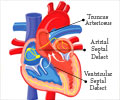
‘The molecule identified holds a great promise as a possible therapeutic target, offering a potential path forward to personalized and precision medicine for dilated cardiomyopathy patients.’
Read More..Tweet it Now
The condition decreases the heart's ability to pump blood because its main pumping chamber, the left ventricle, is enlarged and weakened. Researchers studied the condition at the molecular level in animal models and in explanted human hearts and found that the pathway leading to dilated cardiomyopathy is common in all species.
According to Oudit, who holds the Canada Research Chair in Heart Failure, the condition is caused by biomechanical stress, which activates the gelsolin enzyme.Read More..
"You need some gelsolin, but when it gets out of control, it destroys things. The molecule chews up the filaments, and you get really bad heart failure," said Oudit. "But we have also shown that when you suppress this molecule, you preserve your heart function. It's intact." Oudit said the potential impact on patient care is huge.
"By understanding these patients better, we'll hopefully be able to develop specific therapies for them," he said.
According to Oudit, there are currently no specific treatments for patients with heart failure. The same medications are used for all patients.
"But if we can now identify patients that have problems with this type of remodeling (dilated cardiomyopathy), we can target them specifically," he explained. "That's where we're heading down the road. And to take this research right from the molecule to our patients, it's very rewarding."
Advertisement













